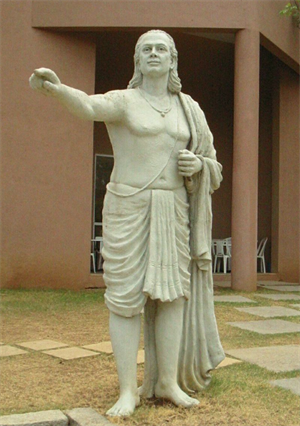
PUMPA - SMART LEARNING
எங்கள் ஆசிரியர்களுடன் 1-ஆன்-1 ஆலோசனை நேரத்தைப் பெறுங்கள். டாப்பர் ஆவதற்கு நாங்கள் பயிற்சி அளிப்போம்
Book Free DemoSOURCES OF EDUCATION:
Explanation:
Education in India included all areas that an individual needs to live a healthy and happy life. It was not theoretical, rather students acquired knowledge in a practical way, gaining hands-on experience with the subjects. Education was divided into various specific areas, each making the student one step closer to achieve a holistic development. Since there was no impact of colonisation, Christian missionaries and their convent style of education had not prevailed until the 18th century. Education still held on to the approaches led by the Vedas, Brahmanas, Upanishads and Dharmasutras. The Vedas codified the ideas and practices of Vedic religion and laid down the basis of classical Hinduism. They were probably composed between 1500 and 700 BC and contain hymns, philosophy, and guidance on ritual. The Brahmanas were scriptures that contained the lengthy commentaries of the Vedas. The Upanishads and Dharmasutras were also sacred religious texts that lay various conflicting points of views of life.
Apart from the scriptures, treatises of various learned scholars also provided as the base for education. Aryabhata was the greatest mathematician and astronomer of the classical age. His famous work 'Aryabhatiya' is still considered one of the best references for plane trigonometry and algebra by students of mathematics. When it comes to Sanskrit, Panini is considered to be the best scholar to be referred. His text 'Aṣṭādhyāyī' a sutra-style treatise on Sanskrit grammar, 3959 verses or rules on linguistics, proved to be a seminal text for early education. Katyayana was also a grammarian and scholar whose texts were referred to in the early times. Patanjali is still regarded as the best scholar for his works on yoga and medicine. When it came to medicine, Charaka who was a physician and Sushrutha, a surgeon, contributed greatly with their writings and research, especially in terms of Ayurveda medicine. These were the major sources and references for early education.

A statue for Aryabhata in Pune*

Ayurvedic form of medicine
Words with difficult meaning:
| S.No | Words | Meaning |
1 | Treatise | A written work dealing formally |
2 | Hymn | Religious songs |
3 | Ayurveda | An alternative medical practice with herbs |
4 | Convent | English medium schools |
5 | Sacred | Religious and pious |
Reference:
- National Council of Educational Research and Training (2008). It so happened. Ancient Education System of India (pp. 89-97). Published at the Publication Division by the Secretary, National Council of Educational Research and Training, Sri Aurobindo Marg, New Delhi.
- Aryabhata*: Public domain, via Wikimedia Commons